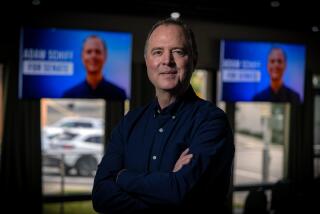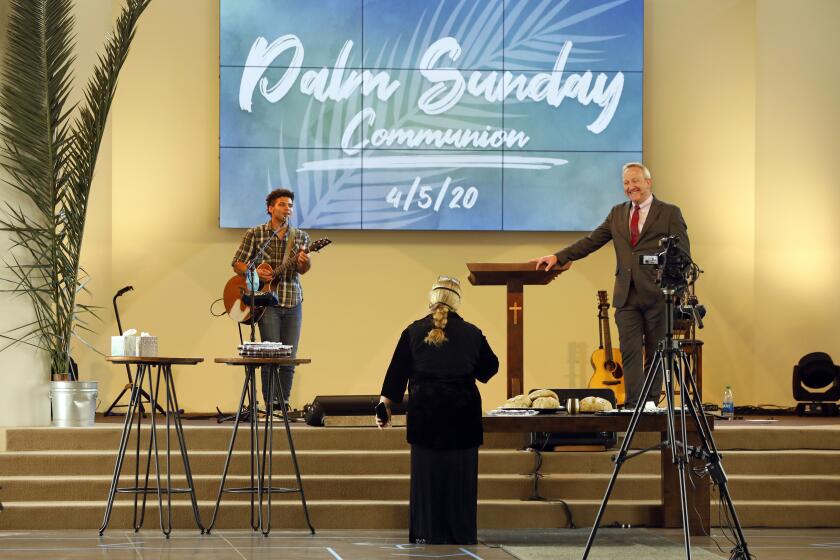Taking on a herculean task
SACRAMENTO — Darrell Steinberg, the next leader of the California Senate, has always relished the uphill battle for the unpopular cause.
While a law student at UC Davis, he pressed for wheelchair lifts in the moot courtroom. Administrators caved to his demands after Steinberg discovered they were sitting on a pot of money that had been allocated for just such projects.
As a union lawyer for fired and disciplined state employees, Steinberg represented a worker who had a mental breakdown after he accidentally backed his car over his own 3-year-old child. Steinberg prevailed in getting the man a less stressful job.
And while a state legislator, Steinberg (D-Sacramento) pushed for more state services for the mentally ill, even using the initiative process to tax millionaires for the added cost.
“It was a very noble cause, and it demonstrates that Darrell will use the levers of power in the most creative ways,” said fellow Democrat and former Assembly Speaker Fabian Nunez of Los Angeles.
When he is elevated to Senate president pro tem on Monday, Steinberg, 49, will face challenges that dwarf his previous projects. The state’s dire fiscal condition could require shrinking the education, healthcare and social services safety net Steinberg has spent his career promoting and protecting.
And his reputation for collegiality and deal-making may not be enough to bridge the ideological divisions between the deeply polarized parties.
“He is decent, very smart, doesn’t exercise his ego, really believes there are solutions to every problem and works with people on both sides of the aisle,” said Barbara O’Connor, director of the Institute for the Study of Politics and the Media at California State University, Sacramento. “Being an optimist right now is a good thing -- otherwise you’d just slash your wrists.”
Steinberg’s upcoming ascension has created unusually high expectations. He will have six years in the job -- an eternity in the world of term limits -- but wants to show major results in his first few months in office. “I intend to shake it up,” Steinberg said in one of several recent interviews. “This place needs a shot of adrenaline.”
Unlike the departing pro tem, Sen. Don Perata (D-Oakland), Steinberg has a collegial relationship with Gov. Arnold Schwarzenegger, who has nicknamed him “Steiny.”
His ability to play tough, however, remains largely untested. Keeping the 25 Senate Democrats in line is no easy thing, and many Democrats worry privately that Steinberg may not have the stomach for confrontation and brinkmanship that legislative leaders often need to employ.
For instance, it has been an open secret in the Capitol that Steinberg has bristled at Perata’s refusal to step down as president before his term ends, even though the caucus chose Steinberg as the next leader back in February.
But when the Sacramento Bee editorialized in early November that Perata should have stepped down months before, Steinberg wrote a letter to the editor defending Perata and praising his “able stewardship.”
“There are different ways to be tough,” Steinberg said in an interview. “My path to success has always been tenacity.”
Steinberg was born in 1959 in San Francisco and grew up in the suburbs south of the city. His father was an accountant at the state insurance department, and his mother was an office manager.
His younger brother Jeff recalls Steinberg playing recordings of Martin Luther King Jr.’s and John F. Kennedy’s speeches over and over and returning home from a school trip one day exultant that he had been photographed with Hubert Humphrey.
“Compassion drives Darrell,” Jeff Steinberg said. He attributed his brother’s empathy to growing up Jewish in a predominantly Gentile community, where “you can’t help but be aware of what it’s like to not be in the majority.”
Today, Steinberg is active in his temple. After three Sacramento synagogues were firebombed in 1999, Steinberg, then in the Assembly, formed a nonprofit organization to promote tolerance and obtained $500,000 in state funding. His group is building a $30-million California Unity Center near the Capitol that is intended to help young people study the history of discrimination and efforts to overcome it.
Steinberg sports a buzz cut and boasts of his ability to tell bad jokes (the variety that begin with someone going into a bar). He revels in the details of policy -- his signature passions include foster care, mental health, affordable housing and children’s health -- sometimes self-deprecatingly.
“I’m getting too deep in the weeds,” he said during one interview in a plaintive cry to a press aide.
Steinberg has achieved some substantial legislative victories by immersing himself in negotiations over details of his bills. One this year was aimed at discouraging sprawl by giving builders of dense communities priority in obtaining transportation funds.
Participants said Steinberg intervened when negotiations were stalled and ultimately won over a critical mass of the building industry by allowing some exemptions from the state’s strictest environmental reviews. Steinberg promoted the bill as a way to tackle global warming, and Schwarzenegger signed the measure into law.
“In terms of the craft of legislative leadership, Darrell is just brilliant,” said Tom Adams, president of the board of the California League of Conservation Voters. “There has not been an important land-use bill in California for 32 years, since the Coastal Act. There are a lot of interest groups, and the issues are fairly difficult.”
Steinberg’s deal-making skills have not always succeeded. In 2006, working at a law firm during a brief stint out of the Legislature, he represented the Maloof brothers’ effort to get taxpayer financing for a new basketball stadium for the family’s team, the Sacramento Kings.
When the Maloofs publicly backed away from the deal he had helped broker, Steinberg resigned. County voters ultimately rejected the proposal after the Maloofs’ already shaky public image was disfigured by their decision to star in television commercials in which the brothers washed down Carl’s Jr. hamburgers with $6,000 bottles of wine.
Steinberg suffered another defeat in the Assembly in 2002 when he tried to remove the financial incentives that big-box and other retail stores hold for cities because of the large sales tax revenues they create. The League of Cities and Towns persuaded state senators to block Steinberg’s proposal, which would have allowed the greater Sacramento region to share in a portion of local sales tax receipts.
But Steinberg lists an unusually ambitious agenda for an incoming leader, especially one entering fiscal straits. He hopes early next year to expand health insurance for children, resolve years of stalemate over the state’s water system and tackle renewable energy.
“We need to achieve some early victories in 2009,” he said.
Steinberg said he hopes concrete achievements will create momentum to tackle the broader dysfunction of California’s political system, including the perpetual gridlock over the annual budget. He also intends to address the state’s epidemic of high school dropouts.
Steinberg is going outside the Legislature to build up his staff. He has hired reporters to dig into the state bureaucracy and figure out how well public programs are working and whether money is being spent as lawmakers intended.
“People expect two things out of government: progress and a real product,” he said. “We need to show people the relationship between their tax dollars and outcomes.”
But, saying that things don’t change overnight, he cautioned against expecting too much: “I’m not in here to do miracles.”
--
jordan. rau@latimes.com
--
(BEGIN TEXT OF INFOBOX)
Darrell Steinberg
Party: Democrat
Occupation: Senate president pro tem-elect
Age: 49, born in San Francisco
Residence: Sacramento
Personal: Married, two children
Education: BA in economics, UCLA, 1981; law degree, UC Davis Law School, 1984.
Career highlights: Employee-rights attorney for the California State Employees Assn., 1985-1994. State administrative law judge, 1994-1998. Sacramento City Council, 1992-1998. State Assembly, 1999-2004. State Senate, 2006-present.
Agenda: Extend healthcare to all children; reduce high-school dropout rate with academically rigorous career tech training; measure government program performance; rework the relationship and responsibilities of local and state government.
More to Read
Get the L.A. Times Politics newsletter
Deeply reported insights into legislation, politics and policy from Sacramento, Washington and beyond. In your inbox three times per week.
You may occasionally receive promotional content from the Los Angeles Times.










